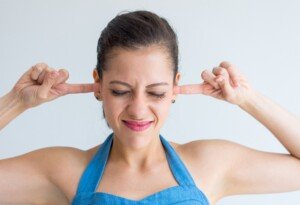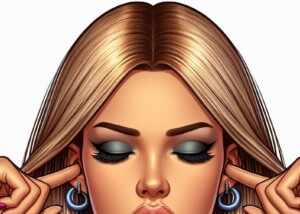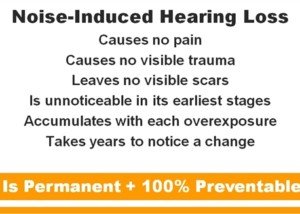Must wanting to avoid loud noise always be an autism thing?
Can’t an autistic person ALSO want to protect their ears from noise induced hearing loss?
Hearing loss stinks. When it reaches a point that you can no longer get by without hearing aids, this isn’t as easy as popping in your hearing aids every day, like putting on a pair of glasses.
Instead, you may need to make multiple visits to your audiologist every year for adjustments to your hearing aids, and each appointment may take a full hour.
I know so because I had a family member whom I frequently accompanied for this very purpose.
The Bane of Hearing Aids
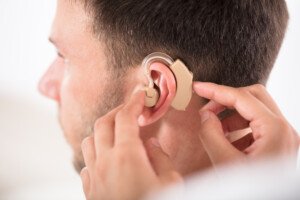
Shutterstock/Andrey_Popov
• Hearing aids are expensive and may not be fully covered by your healthcare plan.
• You must always keep them clean.
• Parts of them can get stuck in your ear and require a trip to the ER to extract, or, best case scenario, a family member spending 20 minutes trying to get in there and safely pull it out (yes, this actually happened to my family member).
• Accidental perforation of an eardrum is possible by aggressively inserting the aid (happened to my family member).
• There will always be times you “misplaced” your aids and are frantically searching for them.
Autism and Loud Sounds
Just because someone’s autistic doesn’t mean that their aversion to loud noise is due to their Autism Spectrum Disorder.
It’s fair to point out, though, that many Autists do find loud noise extremely uncomfortable as a sensory experience, regardless of whether or not they take hearing loss prevention seriously.
During adolescence was when I became hearing health conscious: I didn’t want to have trouble hearing like my father did.
He often worked in the basement using power tools. He mowed the lawn. He also conducted a church choir.
It wasn’t rocket science to figure out what was behind his dulled hearing.
However, in an industrialized society, all of us are bombarded by loud noise – including in close proximity.
This includes leaf blowers, carpet cleaning equipment, garbage trucks, vehicular engines, the screeching of vehicles braking, giant trucks barreling by, the interior of airplanes, sirens, wood chippers and more,
Let’s also not forget sporting events, air shows, movie theatres, karaoke, venues with overly loud microphones, blasting music in fitness classes, thundering overhead speakers at gyms and the slamming of metal weightlifting equipment.
Loudness is ubiquitous in a modern society. It’s difficult to escape it.
This is where earplugs come in, or, for some individuals (not necessarily autistic), noise cancelling headsets.
These are often worn by hunters, airport workers and factory personnel.
But how often do you see these at gyms or movie theatres? It’s rare.
Autistic people, though, are far more likely to wear the decibel-reducing headphones at more common venues such as malls, shopping centers, eateries and even outdoor social activities with a lot of people.
Autistics may also use the much less conspicuous earplugs. I’ve been using custom-made earplugs for many years.
People who know me know that I detest loud sounds. They think it’s because I’m autistic.
I hate loud sounds because enough long-term exposure will lead to NIHL: noise induced hearing loss.
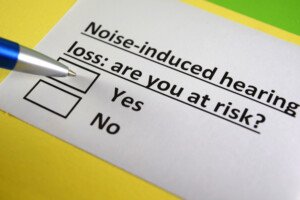
Shutterstock/Yeexin Richelle
Yes, I also find loudness uncomfortable as a sensory experience, but my disdain for it is steeped in knowing that it can permanently damage hearing — and the vast majority of people don’t grasp this.
Who needs hearing impairment from loud noise when it’s bad enough that hearing loss naturally occurs with age?
To say that I plug my ears (when I don’t have the earplugs) when loud sound occurs simply because I have ASD is akin to declaring that if an autistic person puts on sunscreen or bug spray, it’s because they’re autistic.
I don’t want hearing loss. It’s that simple.
Two of my neurotypical siblings have been officially diagnosed with bilateral hearing loss. At least one of them uses hearing aids.
It’s no coincidence that throughout their life, leading up to their diagnosis, they never made efforts to guard their ears from loud noise.
It’s no coincidence that their lifestyle, prior to diagnosis, included repeated exposure to loud noise.
This includes never plugging their ears when a siren went by, when a motorcycle tore by, when nearby people were loudly cheering, or in response to other transient loud sounds.
Wearing earplugs as a precaution was out of the question for my siblings, perhaps due mostly to fearing what other people would think, and maybe a little bit of ignorance of how real NIHL actually is.
I wear earplugs even in my car, as its shock absorption is poor, resulting in continuous loud noise while on a highway.
I wear earplugs at the gym. I wear them at Walmart, Costco and Home Depot (lot of loudness potential, what with shrieking preschoolers, shrill beeping of equipment and a large item suddenly falling to the floor).
I wear them when walking along a street, since at any moment, a deafening motorcycle could rip by or a bus’s braking could screech.
My autism is merely incidental to my diligence at protecting my hearing.
- This has all paid off.
- I’ve always been able to hear far better than other people, including younger.
- Even at gyms, during the days I’d wear noise reduction headphones, I could hear what someone was saying to me while I had on the muffs, yet they had trouble hearing me even though I spoke clearly – presumably because they had NIHL from not protecting their ears at the gym and other places.
- Hearing tests confirm I have good hearing in the normal frequency range.
However, it’s fair to point out that I do, indeed, have noise sensitivities – that are likely due to my neurodivergent brain.
For instance, certain kinds of background noise, even though low in volume, are extremely distracting, such as neighborhood kids playing or a remote control aircraft making repeated rounds over my neighborhood.
Humming from electronic equipment or refrigerators is unpleasant.
The hum of a new refrigerator that came with my new house interfered with my sleep even though I was on the second floor with the door closed.
I bought a new refrigerator after the technician said he couldn’t eliminate it.
I couldn’t stand the new-onset hum of my computer and would run a fan to mask it.
My modem is in the living room because I can’t stand its soft hum.
But my measures to prevent, as much as possible, hearing loss have absolutely nothing to do with autism.
I have two additional siblings who have hearing loss. One is not diagnosed, but it’s obvious.
The other is diagnosed, the result of a mandatory hearing screening for a new job, revealing “both ears are compromised.”
But I, along with other family members, are 100 percent positive he’s on the Spectrum, which is why I didn’t originally mention him.
He never wore earplugs, never. He didn’t mind loudness and associated earplugs with the opposite of manliness and toughness.
Common exposure to the noise of an industrial society can easily cause NIHL.
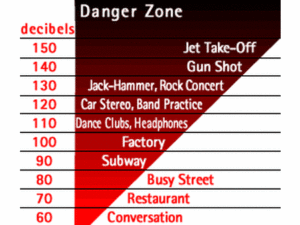
You need not be a construction worker, airport worker, factory employee, avid concert goer or frequent attendee to racecar events to suffer from NIHL.
When my NT nephew was around eight, he plugged his ears at the amusement park when a nearby rollercoaster roared by. The adults didn’t. I had earplugs in. I thought, “That kid is the smartest person here.”
 Lorra Garrick has been covering medical and fitness topics for many years, having written thousands of articles for print magazines and websites, including as a ghostwriter. She’s also a former ACE-certified personal trainer. In 2022 she received a diagnosis of Level 1 Autism Spectrum Disorder.
Lorra Garrick has been covering medical and fitness topics for many years, having written thousands of articles for print magazines and websites, including as a ghostwriter. She’s also a former ACE-certified personal trainer. In 2022 she received a diagnosis of Level 1 Autism Spectrum Disorder.
.

